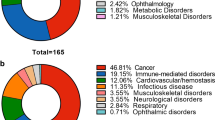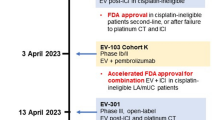Abstract
Monoclonal antibodies (mAbs) have become one of the main therapeutic weapons in modern oncology, mainly as targeted therapies, and immune checkpoint inhibitors. The generation of anti-drug antibodies (ADAs) after their administration can alter their pharmacokinetic, pharmacodynamic, efficacy and safety profile causing infusion-related reactions. Several risk factors have been associated with ADAs development, notably host genetics and immune status, comorbidity, concomitant medications, mAbs molecular structure, dose and route of administration. ADAs are not usually tested on daily clinical practice, being their analysis generally placed in early stages of drug development. ELISA-type assay the most common method. ADAs detection can involve important implications for treatment strategies of cancer patients, guiding therapeutic adjustment. In oncology, some studies about ADAs synthesis related to targeted therapies and immune checkpoint inhibitors have been recently published. Several strategies are proposed to reduce mAbs immunogenicity, such as different schedules, routes of administration or even the use of immunosuppressants. Another question that arises in relation to ADAs generation is the need to measure the concentration levels of active drug to guide the administration schedule. In this review, we will discuss all the aspects that are currently under discussion in relation with ADAs in oncology.

Similar content being viewed by others
References
Chan JCN, Chan ATC (2017) Biologics and biosimilars: what, why and how? ESMO Open. 2(1):e000180. https://doi.org/10.1136/esmoopen-2017-000180 (Published 2017 Mar 24)
Hansel TT, Kropshofer H, Singer T, Mitchell JA, George AJ (2010) The safety and side effects of monoclonal antibodies. Nat Rev Drug Discov 9(4):325–338. https://doi.org/10.1038/nrd3003
van Brummelen EM, Ros W, Wolbink G, Beijnen JH, Schellens JH (2016) Antidrug antibody formation in oncology: clinical relevance and challenges. Oncologist 21(10):1260–1268. https://doi.org/10.1634/theoncologist.2016-0061
Baldo BA (2013) Adverse events to monoclonal antibodies used for cancer therapy: focus on hypersensitivity responses. Oncoimmunology 2(10):e26333. https://doi.org/10.4161/onci.26333
Vaisman-Mentesh A, Rosenstein S, Yavzori M et al (2019) Molecular landscape of anti-drug antibodies reveals the mechanism of the immune response following treatment with TNFα antagonists. Front Immunol 10:2921. https://doi.org/10.3389/fimmu.2019.02921 (Published 2019 Dec 18)
Jawa V, Terry F, Gokemeijer J et al (2020) T-cell dependent immunogenicity of protein therapeutics pre-clinical assessment and mitigation-updated consensus and review 2020. Front Immunol 11:1301. https://doi.org/10.3389/fimmu.2020.01301 (Published 2020 Jun 30)
Doevendans E, Schellekens H (2019) Immunogenicity of innovative and biosimilar monoclonal antibodies. Antibodies (Basel) 8(1):21. https://doi.org/10.3390/antib8010021 (Published 2019 Mar 5)
Benucci M, Damiani A, Li Gobbi F et al (2018) Correlation between HLA haplotypes and the development of antidrug antibodies in a cohort of patients with rheumatic diseases. Biologics 12:37–41. https://doi.org/10.2147/BTT.S145941 (Published 2018 Jan 31)
Blair HA, Duggan ST (2018) Belimumab: a review in systemic lupus erythematosus. Drugs 78:355–366. https://doi.org/10.1007/s40265-018-0872-z
Dunn N, Juto A, Ryner M et al (2018) Rituximab in multiple sclerosis: frequency and clinical relevance of anti-drug antibodies. Mult Scler 24(9):1224–1233. https://doi.org/10.1177/1352458517720044
Wilson A, Peel C, Wang Q, Pananos AD, Kim RB (2020) HLADQA1∗ 05 genotype predicts anti-drug antibody formation and loss of response during infliximab therapy for inflammatory bowel disease. Aliment Pharmacol Ther 51:356–363. https://doi.org/10.1111/apt.15563
Tovey MG, Lallemand C (2011) Immunogenicity and other problems associated with the use of biopharmaceuticals. Ther Adv Drug Saf 2(3):113–128. https://doi.org/10.1177/2du042098611406318
Fehr T, Bachmann MF, Bucher E et al (1997) Role of repetitive antigen patterns for induction of antibodies against antibodies. J Exp Med 185(10):1785–1792. https://doi.org/10.1084/jem.185.10.1785
Collet-Brose J, Couble PJ, Deehan MR, Nelson RJ, Ferlin WG, Lory S (2016) Evaluation of multiple immunoassay technology platforms to select the anti-drug antibody assay exhibiting the most appropriate drug and target tolerance. J Immunol Res 2016:5069678. https://doi.org/10.1155/2016/5069678
Krieckaert C, Rispens T, Wolbink G (2012) Immunogenicity of biological therapeutics: from assay to patient. Curr Opin Rheumatol 24(3):306–311. https://doi.org/10.1097/BOR.0b013e3283521c4e
Hart MH, de Vrieze H, Wouters D et al (2011) Differential effect of drug interference in immunogenicity assays. J Immunol Methods 372(1–2):196–203. https://doi.org/10.1016/j.jim.2011.07.019
Fleri W, Paul S, Dhanda SK et al (2017) The immune epitope database and analysis resource in epitope discovery and synthetic vaccine design. Front Immunol 8:278. https://doi.org/10.3389/fimmu.2017.00278 (Published 2017 Mar 14)
Schlessinger A, Ofran Y, Yachdav G, Rost B (2006) Epitome: database of structure-inferred antigenic epitopes. Nucleic Acids Res 34(Database issue):D777–D780. https://doi.org/10.1093/nar/gkj053
Sailstad JM, Amaravadi L, Clements-Egan A et al (2014) A white paper–consensus and recommendations of a global harmonization team on assessing the impact of immunogenicity on pharmacokinetic measurements. AAPS J 16(3):488–498. https://doi.org/10.1208/s12248-014-9582-y
Wadhwa M, Bird C, Dilger P, Gaines-Das R, Thorpe R (2003) Strategies for detection, measurement and characterization of unwanted antibodies induced by therapeutic biologicals. J Immunol Methods 278(1–2):1–17. https://doi.org/10.1016/s0022-1759(03)00206-0
Swanson SJ (2003) New technologies for the detection of antibodies to therapeutic proteins. Dev Biol (Basel) 112:127–133
Gupta S, Indelicato SR, Jethwa V et al (2007) Recommendations for the design, optimization, and qualification of cell-based assays used for the detection of neutralizing antibody responses elicited to biological therapeutics. J Immunol Methods 321(1–2):1–18. https://doi.org/10.1016/j.jim.2006.12.004.+
U.S. Food and Drug Administration (2010) Guidance for industry: Adaptive design clinical trials for drugs and biologics
European Medicines Agency (2007) Guideline on immunogenicity assessment of biotechnology-derived therapeutic proteins
Ridker PM, Tardif J-C, Amarenco P et al (2017) Lipid-reduction variability and antidrug-antibody formation with bococizumab. N Engl J Med 376:1517–1526
Baker MP, Reynolds HM, Lumicisi B, Bryson CJ (2010) Immunogenicity of protein therapeutics: the key causes, consequences and challenges. Self Nonself 1(4):314–322. https://doi.org/10.4161/self.1.4.13904
Thway TM, Magana I, Bautista A, Jawa V, Gu W, Ma M (2013) Impact of anti-drug antibodies in preclinical pharmacokinetic assessment. AAPS J 15(3):856–863. https://doi.org/10.1208/s12248-013-9484-4
Dostalek M, Gardner I, Gurbaxani BM, Rose RH, Chetty M (2013) Pharmacokinetics, pharmacodynamics and physiologically-based pharmacokinetic modelling of monoclonal antibodies. Clin Pharmacokinet 52(2):83–124. https://doi.org/10.1007/s40262-012-0027-4
Bennett CL, Luminari S, Nissenson AR et al (2004) Pure red-cell aplasia and epoetin therapy. N Engl J Med 351(14):1403–1408. https://doi.org/10.1056/NEJMoa040528
Pascual-Salcedo D, Plasencia C, Ramiro S et al (2011) Influence of immunogenicity on the efficacy of long-term treatment with infliximab in rheumatoid arthritis. Rheumatology (Oxford) 50(8):1445–1452. https://doi.org/10.1093/rheumatology/ker124
Ducourau E, Mulleman D, Paintaud G et al (2011) Antibodies toward infliximab are associated with low infliximab concentration at treatment initiation and poor infliximab maintenance in rheumatic diseases. Arthritis Res Ther 13(3):R105. https://doi.org/10.1186/ar3386 (Published 2011 Jun 27)
Krieckaert CL, Bartelds GM, Lems WF, Wolbink GJ (2010) The effect of immunomodulators on the immunogenicity of TNF-blocking therapeutic monoclonal antibodies: a review. Arthritis Res Ther 12(5):217. https://doi.org/10.1186/ar3147
Colombel JF, Sandborn WJ, Reinisch W et al (2010) Infliximab, azathioprine, or combination therapy for Crohn’s disease. N Engl J Med 362(15):1383–1395. https://doi.org/10.1056/NEJMoa0904492
Heiberg MS, Rødevand E, Mikkelsen K et al (2006) Adalimumab and methotrexate is more effective than adalimumab alone in patients with established rheumatoid arthritis: results from a 6-month longitudinal, observational, multicentre study. Ann Rheum Dis 65(10):1379–1383. https://doi.org/10.1136/ard.2006.051540
Bartelds GM, Krieckaert CL, Nurmohamed MT et al (2011) Development of antidrug antibodies against adalimumab and association with disease activity and treatment failure during long-term follow-up. JAMA 305(14):1460–1468. https://doi.org/10.1001/jama.2011.406
Saffari F, Jafarzadeh A, Kalantari Khandani B, Soleimanyamoli S et al (2018) Immunogenicity of rituximab, trastuzumab, and bevacizumab monoclonal antibodies in patients with malignant diseases. Int J Cancer Manag 11(11):e64983. https://doi.org/10.5812/ijcm.64983
Kverneland AH, Enevold C, Donia M, Bastholt L, Svane IM, Nielsen CH (2018) Development of anti-drug antibodies is associated with shortened survival in patients with metastatic melanoma treated with ipilimumab. Oncoimmunology 7(5):e1424674. https://doi.org/10.1080/2162402X.2018.1424674 (Published 2018 Feb 1)
Hellmann MD, Bivi N, Calderon B et al (2021) Safety and immunogenicity of LY3415244, a bispecific antibody against TIM-3 and PD-L1, in patients with advanced solid tumors. Clin Cancer Res 27(10):2773–2781. https://doi.org/10.1158/1078-0432.CCR-20-3716
de Spéville BD, Moreno V (2021) Antidrug Antibodies and Drug Development: Challenges in the Immunotherapy Era. Clin Cancer Res 27(10):2669–2671. https://doi.org/10.1158/1078-0432.CCR-21-0168
van Vugt MJH, Stone JA, De Greef RHJMM et al (2019) Immunogenicity of pembrolizumab in patients with advanced tumors. J Immunother Cancer 7(1):212. https://doi.org/10.1186/s40425-019-0663-4 (Published 2019 Aug 8)
Vaisman-Mentesh A, Gutierrez-Gonzalez M, DeKosky BJ, Wine Y (2020) The molecular mechanisms that underlie the immune biology of anti-drug antibody formation following treatment with monoclonal antibodies. Front Immunol 11:1951. https://doi.org/10.3389/fimmu.2020.01951 (Published 2020 Aug 18)
Enrico D, Paci A, Chaput N, Karamouza E, Besse B (2020) Antidrug antibodies against immune checkpoint blockers: impairment of drug efficacy or indication of immune activation? Clin Cancer Res 26(4):787–792. https://doi.org/10.1158/1078-0432.CCR-19-2337
Davda J, Declerck P, Hu-Lieskovan S et al (2019) Immunogenicity of immunomodulatory, antibody-based, oncology therapeutics. J Immunother Cancer 7:105. https://doi.org/10.1186/s40425-019-0586-0
Spigel DR, Chaft JE, Gettinger S et al (2018) FIR: efficacy, safety, and biomarker analysis of a phase II open-label study of atezolizumab in PD-L1-selected patients with NSCLC. J Thorac Oncol 13(11):1733–1742. https://doi.org/10.1016/j.jtho.2018.05.004
Rittmeyer A, Barlesi F, Waterkamp D et al (2017) Atezolizumab versus docetaxel in patients with previously treated non-small-cell lung cancer (OAK): a phase 3, open-label, multicentre randomised controlled trial [published correction appears in Lancet. 2017 Apr 8;389(10077):e5]. Lancet 389(10066):255–265. https://doi.org/10.1016/S0140-6736(16)32517-X
Fehrenbacher L, Spira A, Ballinger M et al (2016) Atezolizumab versus docetaxel for patients with previously treated non-small-cell lung cancer (POPLAR): a multicentre, open-label, phase 2 randomised controlled trial. Lancet 387(10030):1837–1846. https://doi.org/10.1016/S0140-6736(16)00587-0
Socinski MA, Jotte RM, Cappuzzo F et al (2018) Atezolizumab for first-line treatment of metastatic nonsquamous NSCLC. N Engl J Med 378(24):2288–2301. https://doi.org/10.1056/NEJMoa1716948
van Vugt M, de Greef R, Freshwater T, Mangin E, van Aarle F, Kondic A (2016) Immunogenicity of pembrolizumab (pembro) in patients (pts) with advanced melanoma (MEL) and non-small cell lung cancer (NSCLC): pooled results from KEYNOTE-001, 002, 006, and 010. J Clin Oncol 34(15_suppl):3063
Agrawal S, Statkevich P, Bajaj G, Feng Y, Saeger S, Desai DD et al (2017) Evaluation of immunogenicity of nivolumab monotherapy and its clinical relevance in patients with metastatic solid tumors. J Clin Pharmacol 57:394–400
Jones TD, Crompton LJ, Carr FJ, Baker MP (2009) Deimmunization of monoclonal antibodies. Methods Mol Biol 525:405–xiv. https://doi.org/10.1007/978-1-59745-554-1_21
Bannas P, Hambach J, Koch-Nolte F (2017) nanobodies and nanobody-based human heavy chain antibodies as antitumor therapeutics. Front Immunol 8:1603. https://doi.org/10.3389/fimmu.2017.01603 (Published 2017 Nov 22)
European Medicines Agency, Committee for Medicinal Products for Human Use (CHMP). Assessment report for Tecentriq (atezolizumab). https://www.ema.europa.eu/en/documents/assessment-report/tecentriq-eparpublic-assessment-report_en.pdf
Farrell RJ, Alsahli M, Jeen YT, Falchuk KR, Peppercorn MA, Michetti P (2003) Intravenous hydrocortisone premedication reduces antibodies to infliximab in Crohn’s disease: a randomized controlled trial. Gastroenterology 124(4):917–924. https://doi.org/10.1053/gast.2003.50145
Arbour KC, Mezquita L, Long N et al (2018) Impact of baseline steroids on efficacy of programmed cell death-1 and programmed death-ligand 1 blockade in patients with non-small-cell lung cancer. J Clin Oncol 36(28):2872–2878. https://doi.org/10.1200/JCO.2018.79.0006
Tolcher AW, Sznol M, Hu-Lieskovan S et al (2017) Phase Ib study of utomilumab (PF-05082566), a 4–1BB/CD137 agonist, in combination with pembrolizumab (MK-3475) in patients with advanced solid tumors. Clin Cancer Res 23(18):5349–5357. https://doi.org/10.1158/1078-0432.CCR-17-1243
Acknowledgements
The authors or this manuscript acknowledge to Dr. José Ignacio Chacón, Medical Oncologist of Medical Oncology Department in Hospital Virgen de la Salud, his contribution on the education of new oncologist residents. He has always been open to help and guide clinical and researching projects. We also would like to acknowledge to Dr. Elia Martínez. She is the light leading this review and many other researching activities and on-going projects.
Funding
This research did not receive any specific grant from funding agencies in the public, commercial, or not-for-profit sectors.
Author information
Authors and Affiliations
Corresponding author
Ethics declarations
Conflict of interest
The authors of this article declare that there is no conflict of interest with respect to its publication. All the authors have participated in the concept and writing and have read and approved the manuscript.
Additional information
Publisher's Note
Springer Nature remains neutral with regard to jurisdictional claims in published maps and institutional affiliations.
Rights and permissions
About this article
Cite this article
Borregón, M., Martínez, K., Ramos, A. et al. Anti-drug antibodies in the current management of cancer. Cancer Chemother Pharmacol 89, 577–584 (2022). https://doi.org/10.1007/s00280-022-04418-2
Received:
Accepted:
Published:
Issue Date:
DOI: https://doi.org/10.1007/s00280-022-04418-2




